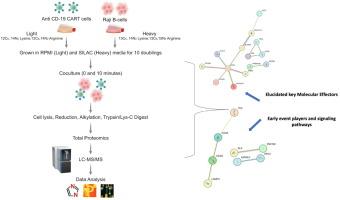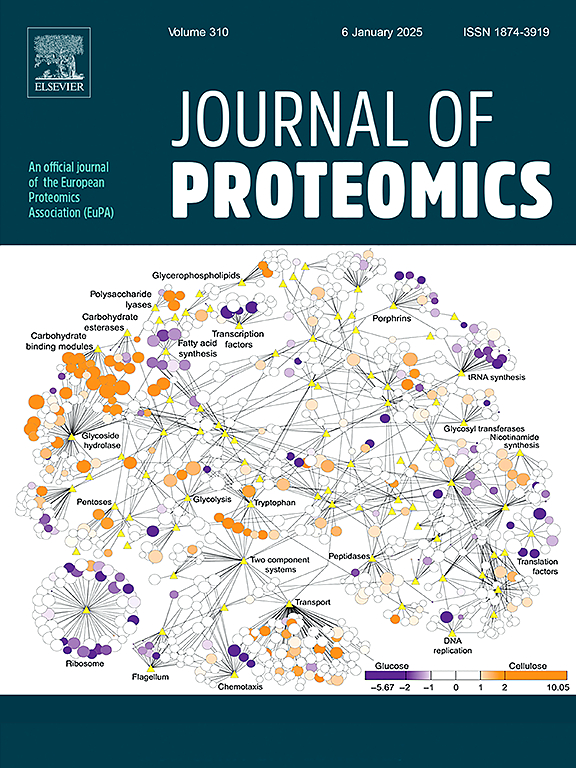Proteomics analysis reveal early event molecular effectors of anti-CD19 CAR-T cell therapy in hematological cancer
IF 2.8
2区 生物学
Q2 BIOCHEMICAL RESEARCH METHODS
引用次数: 0
Abstract
Chimeric antigen receptor T-cell (CAR-T) therapy is at the forefront of the field of cell immunotherapy. In this study, we generated an anti-CD19 CAR-Jurkat T cell line using a locally produced second-generation anti-CD19 CAR construct, which allowed us to analyse early proteomic changes that are crucial for comprehending the signalling pathways and mechanism of action of this CAR-T cell. SILAC-heavy tagged Raji B-cells and anti-CD19 CAR-Jurkat T-cells were co-cultured for ten minutes. The proteomic profiles were acquired via DIA methodology on the Orbitrap Astral LC-MS/MS platform. The proteome was extensively covered, resulting in about 8800 protein identifications at 1 % FDR. The effector CAR-Jurkat cells showed proteomic changes involving antigen presentation by CD74. The target Raji B-cells exhibited more significant alterations. Effector proteins, namely CD247, CD28, DAP, LCK, p38 MAPK, and CASP3, were validated, as they have critical roles in antigen presentation, T-cell activation, and apoptosis. Pharmacological inhibition of LCK using Dasatinib further suggested its pivotal role in early CAR-T signalling. This study led us to identify proteins that function as molecular effectors of anti-CD19 CAR-T cell therapy during the initial phases of CAR-T-target cell engagement, advancing our knowledge of the mechanism and signalling pathways that will support CAR-T cell development.
Significance
Chimeric antigen receptor T-cell (CAR-T cell) therapy is state-of-the-art in cell and immunotherapy. Determining important players in cellular communication and signalling mediated by membranes and intracellular proteins requires understanding the connection between tumours and modified cells. We employed global proteomics in this study to better grasp the functional protein networks using a high-sensitivity mass spectrometric platform for protein identification and quantification. We identified proteins as molecular effectors of anti-CD19 CAR-T cell treatment during the early stages of CAR-T-target cell interaction. Our understanding of the mechanism and signalling pathways will promote the development of new CAR constructs and improve the efficacy and ability to overcome the resistance of this innovative cancer treatment strategy, which will advance the identification of adjuvant molecules for the regulation of CAR-T responses.

蛋白质组学分析揭示抗cd19 CAR-T细胞治疗血液肿瘤的早期事件分子效应。
嵌合抗原受体t细胞(CAR-T)治疗是细胞免疫治疗领域的前沿。在这项研究中,我们使用本地生产的第二代抗cd19 CAR构建物生成了一种抗cd19 CAR- jurkat T细胞系,这使我们能够分析早期蛋白质组学变化,这对于理解这种CAR-T细胞的信号通路和作用机制至关重要。重silac标记的RAJI b细胞和抗cd19 CAR-Jurkat t细胞共培养10分钟。在Orbitrap Astral LC-MS/MS平台上通过DIA方法获得蛋白质组学图谱。蛋白质组被广泛覆盖,在1 % FDR下产生了大约8800个蛋白质鉴定。效应CAR-Jurkat细胞表现出涉及CD74抗原呈递的蛋白质组学变化。靶RAJI b细胞表现出更显著的变化。效应蛋白,即CD247、CD28、DAP、LCK、p38 MAPK和CASP3,因为它们在抗原呈递、t细胞活化和凋亡中起着关键作用,因此得到了验证。达沙替尼对LCK的药理抑制进一步表明其在早期CAR-T信号传导中的关键作用。这项研究使我们确定了在CAR-T靶细胞参与的初始阶段作为抗cd19 CAR-T细胞治疗分子效应物的蛋白质,促进了我们对支持CAR-T细胞发育的机制和信号通路的了解。意义:嵌合抗原受体t细胞(CAR-T细胞)治疗是细胞和免疫治疗的最新技术。确定细胞膜和细胞内蛋白介导的细胞通讯和信号传导的重要参与者需要了解肿瘤和修饰细胞之间的联系。本研究采用全球蛋白质组学技术,利用高灵敏度质谱平台对蛋白质进行鉴定和定量,从而更好地掌握功能蛋白网络。我们发现在CAR-T靶细胞相互作用的早期阶段,蛋白质是抗cd19 CAR-T细胞治疗的分子效应物。我们对其机制和信号通路的理解将促进新的CAR构建物的开发,提高这种创新癌症治疗策略的疗效和克服耐药性的能力,这将推进CAR- t反应调节的辅助分子的鉴定。
本文章由计算机程序翻译,如有差异,请以英文原文为准。
求助全文
约1分钟内获得全文
求助全文
来源期刊

Journal of proteomics
生物-生化研究方法
CiteScore
7.10
自引率
3.00%
发文量
227
审稿时长
73 days
期刊介绍:
Journal of Proteomics is aimed at protein scientists and analytical chemists in the field of proteomics, biomarker discovery, protein analytics, plant proteomics, microbial and animal proteomics, human studies, tissue imaging by mass spectrometry, non-conventional and non-model organism proteomics, and protein bioinformatics. The journal welcomes papers in new and upcoming areas such as metabolomics, genomics, systems biology, toxicogenomics, pharmacoproteomics.
Journal of Proteomics unifies both fundamental scientists and clinicians, and includes translational research. Suggestions for reviews, webinars and thematic issues are welcome.
 求助内容:
求助内容: 应助结果提醒方式:
应助结果提醒方式:


